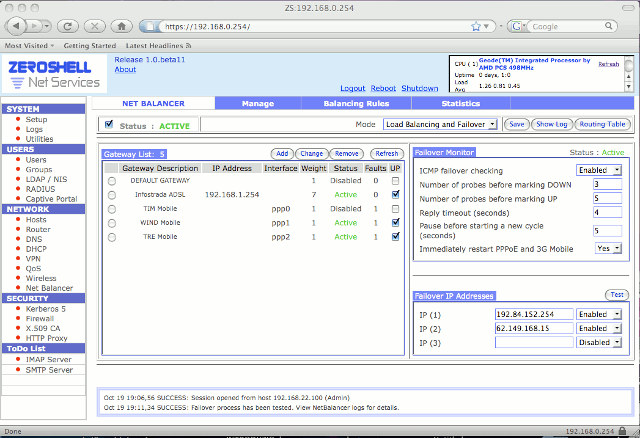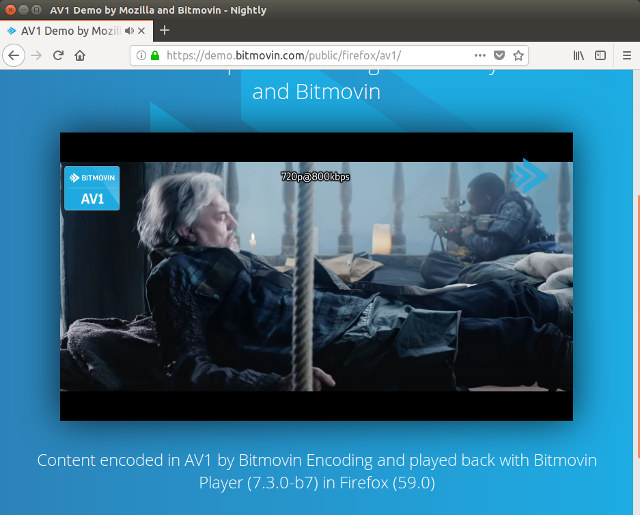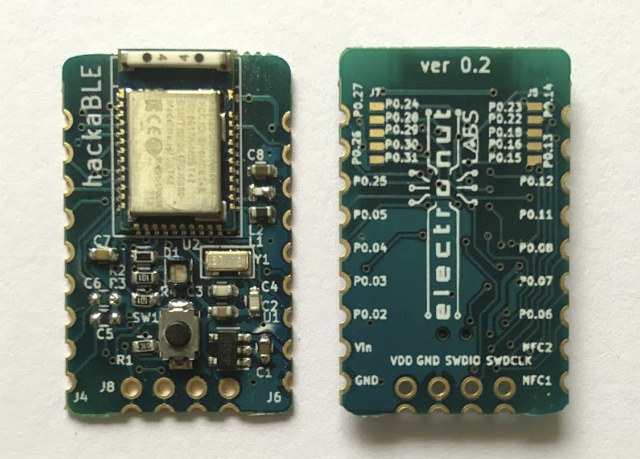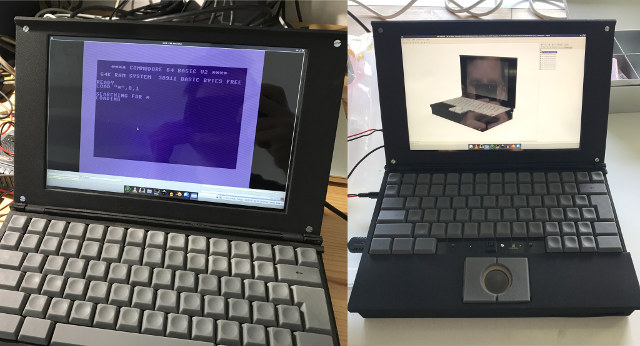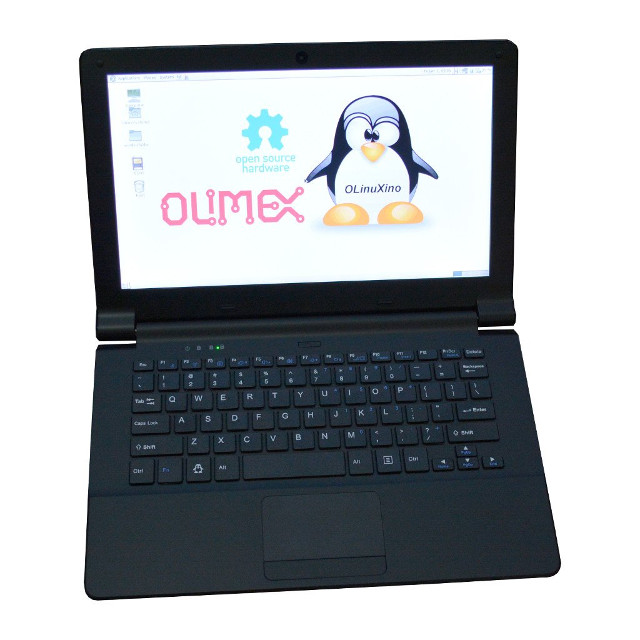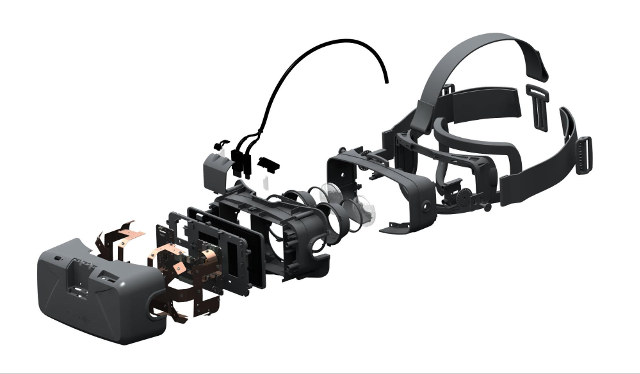We’ve just seen pfSense is now available for Arm via firewall appliances such as Netgate SG-3100, but AFAIK there’s no pfSense community Arm firmware images yet. Several Arm SoCs & boards are now supported by FreeBSD, so in theory pfSense could be ported to those, but the page on FreeBSD does not seem to have been updated for a while. If you want a firewall distributions with an easy-to-user web interface like pfSense, but that also works on cheaper Arm hardware, Linux based ZeroShell distribution could be worth a try, as beside working on Intel & AMD x86 platforms, the developers also provides images for Raspberry Pi 2 & 3 boards, and several Orange Pi boards, namely Orange Pi R1, Orange Pi Zero, Orange Pi PC, and Orange Pi Plus/Plus2. The latter is the only supported Arm board with Gigabit Ethernet. Some of ZeroShell features include: Load Balancing and Failover of […]
Mozilla Adds HTML5 AV1 Video Support to Firefox 59 Nightly Builds
Last year, we wrote about AV1 royalty-free open source video codec managed by the Alliance for Open Media (AOMedia), a non-profit organization with members such as Amazon, Cisco, Google, Intel, Microsoft, Mozilla, and other companies. Eventually AV1 should be 25 to 35% more efficiency than H.265 or VP9, but encoding will be slower, and at the time, my AMD FX8350 based computer could encode CIF (352×288) video at less than 0.5 fps, and I had to use command line tools to encode and decode/playback the videos. But thing are progressing nicely, and it’s now possible to stream AV1 video with HTML5 / in Firefox 59.0 (nightly) using Bitmovin Player. If you are using Ubuntu, you can also install Firefox nightly as follow:
|
1 2 3 |
sudo add-apt-repository ppa:ubuntu-mozilla-daily/ppa sudo apt-get update sudo apt-get install firefox-trunk |
Start it and visit the demo page to stream an AV1 MPEG-DASH/HLS stream in your web browser. It works from 360p @ 200 Kbps up to 720p […]
NXP Announces OpenIL Industrial Real-Time Linux Distribution for Industry 4.0
NXP has announced the release of OpenIL industrial Linux distribution with real-time OS extensions and Time-Sensitive Networking (TSN) support for factory-automation for the Industry 4.0 era. The OpenIL distribution includes support for per-stream policing, time-aware shaping of network traffic, and 801.1AS time synchronization, and supports NXP Layerscape SoCs and boards such as LS1028A dual ARMv8 processor, or LS1021A-IOT IoT gateway. Some notable OpenIL features include: Xenomai real-time extensions to Unix, making porting relatively easy from an RTOS like VxWorks or pSOS Extensible Markup Language (XML) and NETCONF-based network configuration utilities for TSN Generalized precision time protocol (gPTP) with the linuxptp daemon Drivers for the Ethernet Interfaces and the NXP SJA1105T TSN switch Support for edge computing services Optional instantiation of the Ubuntu user-space filesystem layout You’ll find the source code on Gihub, and some more information on OpenIL.org website. NXP appears to be the only company involved in the project, […]
HackaBLE Board is a Tiny, Breadboard-Friendly Bluetooth LE Development Board
Earlier this year, I wrote about Electronut Labs’ Bluey development board powered by Nordic Semi nRF52832 development board with BLE, NFC, and a few sensors, and partially open source hardware with the KiCAD schematics and PCB layout available on Github. The company is now back with another open source hardware nRF52832 BLE board, namely hackaBLE, that’s much smaller (28x18mm), and with 2.54mm pitch castellated pin headers making suitable for use for breadboard, or as a module on a custom designed board. hackaBLE board specifications: SoC – Nordic Semi nRF52832 ANT + BLE ARM Cortex-M4 @ 64 MHz processor with 512kB flash, 64kB RAM Connectivity – Bluetooth 4.2/5 LE and other proprietary 2.4 GHz wireless standards via chip antenna Expansion 2x 9-pin castellated headers with GPIO, 5V, 3.3V, and GND 2x 5-pin solder pads for more I/Os Debugging – 4-pin SWD header Misc – RGB LED, and user button Power Supply […]
MNT Reform DIY Modular ARM Linux Portable Computer To Feature NXP i.MX 6/8 SoC
The first usable DIY ARM Linux laptop that I can remember is Novena, unveiled in 2014, based on Freescale i.MX 6Quad processor, and fairly expensive at close to $2,000 since it was a nice product. Recently, we’ve had more affordable options with products such as Olimex TERES-I laptop (Allwinner A64), and the second version of Pi-Top laptop shell for Raspberry Pi 3. There may soon be another option as MNT Media and Technology (Lukas F. Hartmann) partnered with an industrial designer (Ana Dantas) to work on “Reform”, a DIY and modular laptop / portable computer powered by NXP i.MX 6QuadPlus quad core ARM Cortex A9 processor, and eventually i.MX 8 hexa core Cortex A72/A53 processor. They are the prototype stage right now, and mostly looking for feedback. The preliminary specifications and features of the Reform portable computer include: SoC – NXP i.MX 6QuadPlus quad core Cortex A9 processor @ up […]
Olimex TERES-I DIY OSHW Laptop Now Up for Sale for 240 Euros
Olimex has been working on their open source hardware TERES-I DIY laptop since last year. The laptop is supposed to come in kit form, so that you can build it yourself. Every board and most parts are open source to let your easily repair it, or improve it by adapting the part to your own needs. The company has now launched the laptop kit for 240 Euros in black or white. Olimex TERES-I laptop updated specifications: SoC – Allwinner A64 quad core ARM Cortex-A53 processor @ 1.2 GHz with Mali-400MP2 GPU System Memory – 2GB DDR3L Storage – 16 GB eMMC Flash, micro SD slot Display – 11.6″ LCD display with 1366×768 resolution Video Output – 1x HDMI 1.4 port Audio – Via mini HDMI, 3.5mm audio jack, 2x speakers, microphone Connectivity – 802.11 b/g/n WiFi up to 150Mbps, Bluetooth 4.0 LE USB – 2x USB port ports Front camera […]
Oculus Rift Virtual Reality Development Kit 2 Becomes Open Source Hardware
Oculus Rift DK2 virtual reality headset and development kit started to ship in summer 2014. The DK2 is kind of VR headset that is connected to a more powerful computer via USB and HDMI, includes hardware for positional tracking, a 5″ display ,and two lenses for each eye. Since then the company has been purchased by Facebook, and they’ve now decided to make the headset fully open source hardware. The release includes schematics, board layout, mechanical CAD, artwork, and specifications under a Creative Commons Attribution 4.0 license, as well as firmware under “BSD+PATENT” licenses which you’ll all find on Github. The release is divided into four main folders: Documentation with high-level specifications for the DK2 headset, sensor, and firmware. Cable with schematics and high level specifications for the cables. Custom assembly that would be hard to recreate from source. Allegedly the most complex part of the design Sensor with […]
Purism Librem 5 Open Source Linux Smartphone Meets its 1.5 Million Dollars Funding Target
Back in the summer, we reported about Purism Librem 5, a privacy-focused, open source Linux smartphone. The hardware has not been developed yet, at the time the company was still considering either i.MX 6 Cortex A9 processor or i.MX8 Cortex A53 processor for the phone, and asked for 1.5 million dollars in their self-managed crowdfunding campaign to get the phone delivered in 2019. The project was interesting but with the current status for the project, amount to be raised, and delivery timeline, it was a long shot. But it turns out there’s some demands for smartphones outside of Android and iOS ecosystem, and since then, KDE and the GNOME foundation have joined the project leading to more coverage & people getting involved, and Librem 5 phone is now fully funded with 13 days to go. The processor will likely be NXP i.MX 8M Quad quad core Cortex A53 SoC, as […]


